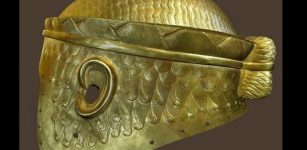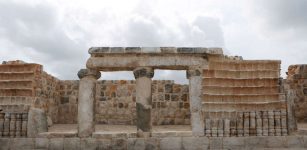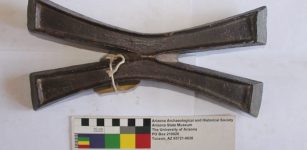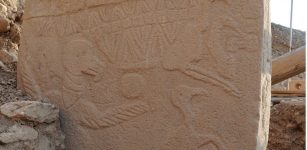2,300-Year-Old Tablet Found In Mugla, Turkey – Region Of Great Historical Importance In Ancient Times
Conny Waters - AncientPages.com - A 2,300-year-old tablet with the ancient Greek alphabet was accidentally discovered inside the garden wall of a school in Turkey's southwestern Mugla province during road construction works, reports Daily Sabah.
The tablet, which was safely removed from the wall is from the 3rd century B.C. and archaeologists believe that it was initially attached to a statue. He noted that a part of the tablet had been broken, making it illegible.
2,300-year-old tablet discovered in school wall in southern Turkey. Image credit: DHA Photo
For now not much is known about the artifact but it was found in the region which was of great historical importance in ancient times.
In ancient times in Anatolia, the region between the Menderes (Meander) and Dalaman (Indus) rivers in the south was called Caria. The inhabitants were Carians and Leleges. In his "Iliad"by Homer, the Carians were described as natives of Anatolia, defending their country against Greeks in joint campaigns in collaboration with the Trojans.
A major city of ancient Caria, Mugla is known to have been occupied by raiding parties of Egyptians, Assyrians and Scythians, until eventually the area was settled by Ancient Greek colonists.
The Greeks inhabited this coast for a long time building prominent cities, such as Knidos (at the end of the Datça Peninsula) and Bodrum (Halicarnassos), as well as many smaller towns along the coast, on the Bodrum Peninsula and inland, including in the district of Fethiye the cities of Telmessos, Xanthos, Patara and Tlos.
Eventually the coast was conquered by Persians who were in turn removed by Alexander the Great, bringing an end to the satrapy of Caria.
Later, the province also became a significant naval power, trading with the Aegean Islands, Crete and as far as Venice and Egypt. Turkish settlement during the Menteshe period usually took place through migrations along the Kütahya-Tavas axis.
In 1390, Mugla was taken over by the Ottoman Empire. However, just twelve years later, Tamerlane and his forces defeated the Ottomans in the Battle of Ankara, and returned control of the region to its former rulers, the Menteshe Beys, as he did for other Anatolian beyliks. Mugla was brought back under Ottoman control by Sultan Mehmed II the Conqueror, in 1451. One of the most important events in the area during the Ottoman period was the well-recorded campaign of Süleyman the Magnificent against Rhodes, which was launched from Marmaris.
"It is possible that the tablet was written to honor someone who served the city at the time and it might have been placed beside a statue as a means to thank the person," Özalp said, adding that an analysis by museum experts will determine the exact date of the tablet.
Written by Conny Waters - AncientPages.com Staff Writer





















